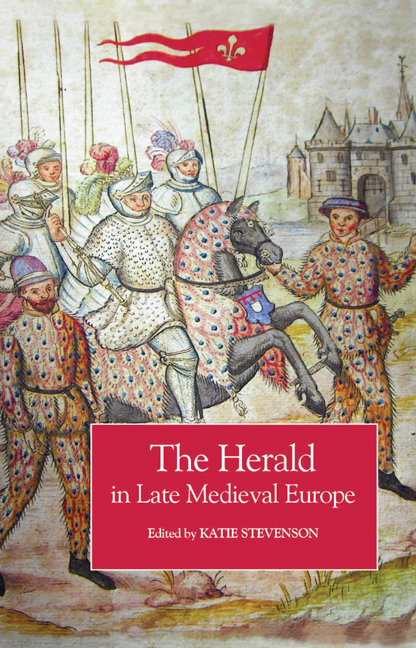Book contents
- Frontmatter
- Contents
- List of Illustrations
- Notes on Contributors
- Acknowledgements
- Abbreviations
- 1 Introduction
- 2 The Development of the Office of Arms in England, c. 1413–1485
- 3 Ancient Precedent or Tudor Fiction? Garter King of Arms and the Pronouncements of Thomas, Duke of Clarence
- 4 Jurisdiction, Authority and Professionalisation: The Officers of Arms of Late Medieval Scotland
- 5 The March of Brittany and its Heralds in the Later Middle Ages
- 6 City Heralds in the Burgundian Low Countries
- 7 King of Arms of the Ruwieren: A Special Function in the German Empire
- 8 Heraldry, Heralds and Politics in the Republic of Florence in the Late Middle Ages
- 9 Tournaments, Heraldry and Heralds in the Kingdom of Poland in the Late Middle Ages
- 10 A time when ‘fools and dwarfs were highly esteemed’? Seeking the Late Medieval Scandinavian Herald
- Index
9 - Tournaments, Heraldry and Heralds in the Kingdom of Poland in the Late Middle Ages
Published online by Cambridge University Press: 26 October 2017
- Frontmatter
- Contents
- List of Illustrations
- Notes on Contributors
- Acknowledgements
- Abbreviations
- 1 Introduction
- 2 The Development of the Office of Arms in England, c. 1413–1485
- 3 Ancient Precedent or Tudor Fiction? Garter King of Arms and the Pronouncements of Thomas, Duke of Clarence
- 4 Jurisdiction, Authority and Professionalisation: The Officers of Arms of Late Medieval Scotland
- 5 The March of Brittany and its Heralds in the Later Middle Ages
- 6 City Heralds in the Burgundian Low Countries
- 7 King of Arms of the Ruwieren: A Special Function in the German Empire
- 8 Heraldry, Heralds and Politics in the Republic of Florence in the Late Middle Ages
- 9 Tournaments, Heraldry and Heralds in the Kingdom of Poland in the Late Middle Ages
- 10 A time when ‘fools and dwarfs were highly esteemed’? Seeking the Late Medieval Scandinavian Herald
- Index
Summary
THE WAYS in which tournaments influenced the development of heraldry – and, as a consequence, the role of heralds – have long been an area of historical research. However, such research has been dominated by western European scholars, and there has been little, if any, examination of the heraldic history of other European regions. This is especially disappointing as the experiences of central and eastern Europe offer different perspectives from those provided by their western European counterparts. Therefore, this essay attempts to redress some of this imbalance by concentrating on the kingdom of Poland, a kingdom that has been largely overlooked by scholars of medieval chivalric culture, yet is one which reveals much about the diffusion of chivalry and heraldry across wider Europe. For example, the tournament was well known and frequently practised in medieval Poland but Polish tournaments are wholly unfamiliar to western European scholars. Moreover, the tournament had a profound influence on the development of a distinctive Polish heraldic culture. However, the practitioners of this culture, the officers of arms, had a short-term role in the history of Polish chivalry, operating only in the latter half of the fourteenth century to the mid-fifteenth century.
Western European chivalric culture had started to permeate Polish elite society from the end of the eleventh century. The crusades, military skirmishes, pilgrimages and diplomatic contact ensured that Polish knights had ample points of contact with western culture. Chivalry developed in Poland as it did elsewhere and from the thirteenth century onwards Polish knights took on increasing social status and standing in elite and political society. This was accompanied by patterns that are comparable with western European practices in the customs of dubbing, ideas on idealised chivalric behaviour, and the development and popularity of the tournament. Courts were pivotal in the diffusion of chivalric culture into Poland via the frontier region and cultural crossroad of Silesia (bordering with Germany and Bohemia). During the period of the break-up of Poland into dukedoms and especially from the thirteenth century, the impetus was from the ducal courts; and, after the restitution of the Polish kingdom in 1320, from the royal court. In the late Middle Ages the court of the grand master of the Order of the Teutonic Knights was also a strong stimulus to chivalrous activities.
- Type
- Chapter
- Information
- The Herald in Late Medieval Europe , pp. 149 - 168Publisher: Boydell & BrewerPrint publication year: 2009

